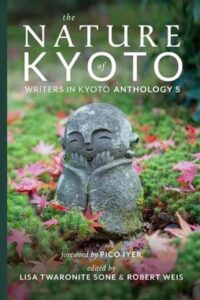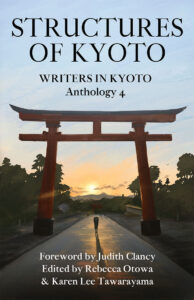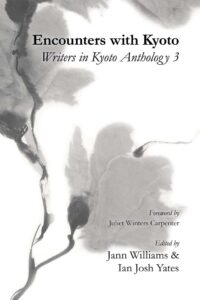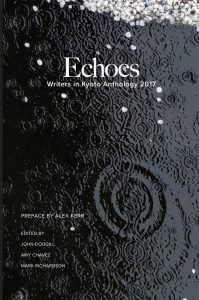by Cody Poulton
On New Year’s Day in Kyoto my wife and I visited a friend in Fushimi. He is an architect and amateur soccer player who also happens also to be a Pure Land Buddhist priest. I discussed my interest in finding some old house in town to fix up and make liveable. But, of course, the costs involved in all that might be prohibitive. Takeda made me a proposal. If I were retiring and looking for a place to live, I could do worse than becoming a Pure Land priest: free temple, tax free living, funerals as fringe benefits. He gave me a little Pure Land breviary to get the hang of things. Back in Canada I told the story to a couple over dinner. “I always wanted to fuck a priest,” said my friend, before she was ushered swiftly out the door by her husband.
Heading north on Gokōmachi toward Marutamachi one night after dinner, my friend Mr. T and I discovered the “Terra Bar,” tucked into an old storehouse on the grounds of a temple. A warm and cosy refuge from the rain. The bartender was the priest, which was Pure Land sect. Enterprising fellows, these Pure Land bonzes! One of the customers sitting next to me told me she’d done a working holiday in Vancouver when she was younger. She was the priest’s wife. Things were fine until the priest did what priests do, and that was give a sermon. This one was on the rather macabre topic of how to dispose of human bodies in space. The priest is a member of a study circle called the “research group on cosmic ethics,” which consists of fifteen students and sixteen teachers. What if you die in space? You can’t get cremated, nor can they bury you. Eject you from your spaceship and your corpses will follow your vessel in orbit, like a loyal dog. Imagine looking out the porthole and seeing Bob out there, tagging along. Since resources are precious, would your body be transformed into food or fuel? How would people feel about that? I watched T grow more depressed as he drank his Corona. We got the hell out of Terra Bar as fast as we could.
Monks on my mind … Downstairs from where I live, there is an izakaya run by a cool and witty couple who serve food that has put them on the Michelin Guide. The okamisan seats me next to a burly guy with a buzzcut who, in short order, tells me he has in-laws coming from Israel, Holland, and Colombia for the holidays. He has three daughters and they married men from three different countries and settled there. He asks me the usual questions. How long have I been in Japan? How old am I? What I do for a living? etc. I reciprocate. It turns out he’s chief priest of Myōkenji, one of the neighbourhood temples. He told me his dream of setting up a piano in the hondō for people to play.
“You know how they put pianos at stations for anyone to come play? ‘Eki-piano,’ they call it. I want to make a ‘tera piano.’”
“Rhymes with therapy,” I said. “Go for it!”
A little later, a bald-pated younger man enters and sits down beside him. He’s the priest of Myōkakuji, just up the road from Urasenke country. Both are Nichiren temples, and the priest of Myōkenji introduced the priest of Myōkakuji as his “disciple” (deshi). Both temples have deep ties to Ogata Kōrin and the Rinpa artists, as well as to the Senke Tea schools, both Ura and Omote. Oda Nobunaga used Myōkakuji as a hotel whenever he was in Kyoto. (That is until Honnōji—bad move, Nobunaga!) The disciple said he knew his master had come to Wasabi because his bicycle was parked outside. He makes regular rounds (manben naku!) of all the local pubs. I am constantly running into him in one watering hole or another.
Master Oikawa (Oi-chan for short), the priest of Myōkenji, is 78 and looks like a sumo wrestler. He said he is often mistaken for a Mongolian. The disciple said approvingly that Oikawa was fit and sturdy from a life on the mats doing judō. That’s why he was still riding a bike at his age.
Oi-chan took off, leaving the disciple with me. By this point, I’m ready to head home too, so I ask for the bill. “You don’t happen to know a pastor, do you?” asks the okamisan. “I run a bridal business on the side and we’re short of them.” I tell her I just happen to know one, an Anglican, in Ashiya. He and I were high school classmates and we both ended up in Japan. “Here’s my card. Give me a wankiri (a ring and hang up ),” she said, in order to register my private phone number. “I do weddings at the railway museum, the aquarium, and the Franco-Japanese Cultural Centre,” she said. “But we’re short of priests. I don’t suppose he’s Protestant, is he?” she asked. I assured her he was.
In a bonze-ridden town, pastors are in short supply.
***********************
For more of Cody’s work in English, see his Palm-of-the-Hand Story, or his account of being In Transit between Canada and Kyoto, or a description by Rebecca Otowa of his lunchtime talk about Japanese theatre.
Here follows a Japanese translation of Monks on My Mind.
「気になる坊主ども」
Cody Poulton
Part I.
こんな夢を見た。
人の集まりに行ったら、誰も赤の他人だった。飼っているペットも初対面。誰かの子猫に噛まれた。次は違う人の犬に噛まれた。最後に誰かの山羊はしっかりと僕の手を噛み突いてなかなか離さなかった途端、覚めた。すぐ妻にその夢を語ると、彼女は「私や!その山羊」、と。
元旦に伏見へ友達のお宅を訪れた。友達は建設の設計士の傍らに、浄土真宗のお寺の住職を務めている。趣味はサッカー。僕は町屋をリフォームして京都に楽隠居しようかという話をした。ただ、セカンドハウスを買う余裕がないのかと悩むと、彼は「こうしたら、お金がかからないよ。坊主になったら、まずお寺をもらう。税金も掛からへん。おまけにお葬式でお小遣いが貯まる。」坊主になるための宿題として『浄土宗日常勤業式』という経本をくれた。
帰国したらある晩友達にその話をした。彼らが帰る時に、「神父でもいい、坊主でもいいーずっと前からああいう方を抱きたかったの!」と彼女が言い出したら、旦那に玄関からさっさと連れられて去ってしまった。
ある夜食後に友達との帰りに御幸町を丸太町へ向かうと、お寺の玄関に蔵があった。その中に賑やかな飲み屋の気配がした。バーテンはその寺の住職。ようやるな、浄土真宗の坊ん(ぼん)さん!と思った。入ってみたらこじんまりな、明るい風景。お客さんは五、六人かな。みなさんはウエルコム。一人の女の人は若い頃バンクーバーでワーホリをやった。彼女はその坊主の妻。面白い団欒だと思ったら、坊主は坊主で、いよいよお説教が始まった。最近この坊さんは「宇宙倫理学研究会」の会員になった。その中に学生は15人で先生はなんと16人。変な研究会。この間こういう話があった。
宇宙飛行士は宇宙で死んだらその遺体の後始末をどうする、という問題。埋葬はもちろん、火葬も無理。宇宙船から放り出すと、そのまま宇宙船を愛犬のように着いていく。窓から「太郎がそこに」といつも思い出させてくれる。宇宙に材料はとても貴重だ。それなら、その屍を燃料で燃やすか、それとも食べるのか、という討論。
これを聞いたら、我が友はますます鬱になることに気がついた。僕は「行こうよ」と言い、二人でそのまま「お寺バー」を逃げた。
気になる坊主ども。僕の住んでいるマンションのすぐ下に居酒屋がある。大将と女将さんはとっても気さくなペアーでおばんざいが美味しい。ある晩女将さんは頭が丸坊主で体が頑丈なおじさんの隣に僕を座らせた。その男は年末にイスラエルからとオランダから、そしてコロンビアからの子供たちと孫たちを迎えると僕に述べた。大変です!みんなそれぞれ言葉が違う。彼の子供は7人の中に娘3人は外国の人と嫁いだのだ。彼の名前は及川さんー愛称は「おいちゃん」。
おいちゃんは近所の妙顕寺の住職。これからお寺でやってみたいのは本堂にピアノを置くこと。「駅ピアノって聞いたことがあるやろ?俺は「寺ピアノ」を提供したいのです。近所の人がいつでも自由に弾けるように」と言った。
「寺ピアノ?テラピーにかけて聞こえがいいね。是非やるべき!」
その後、もう一人の坊主が店に入って隣に座った。彼は近くの妙覚寺の住職でおいちゃんの弟子。妙顕寺と妙覚寺はご存知かも知れないが、日蓮宗のお寺なのだ。どっちも表千家、裏千家の今日庵付近でお茶と深い縁がある。戦国時代に織田信長は妙覚寺をホテルのように使った。妙覚寺の住職の林さんはおいちゃんの自転車が店の前で置いたのを見て先生が入っていることが分かった。おいちゃんは毎晩のように満遍なく近所の飲み屋巡りをしているのだ。がっしりした体型のおいちゃんは昔から柔道をやっているので、78歳の割に元気なお爺さんだ。
おいちゃんがそろそろ飲み終わって帰ろうとすると、僕も会計を頼んだ。「コーディさんは牧師を知らない?」と女将さんに聞かれた。僕はたまたま高校時代の同級生が芦屋で日本聖公会の牧師をやっているから紹介します、と彼女に答えた。彼女は自分の名詞を差し上げて、「この電話番号です。ワン切りして交換しよう。」と言った。彼女は昼の間京都の水族館や鉄道博物館や日仏文化会館などで結婚式や披露宴を企画しているが、この坊主まみれの町に牧師は珍しい。






Recent Comments